
If it seems like your local trails are looking more crowded recently, it’s for good reason—there are many benefits of hiking, including improved cardiovascular health, added strength and agility, and for some, better mental health.
As this outdoor activity grows in popularity, the reality is that many hikers are hitting the trail unprepared. Always make sure you bring a stocked hiking emergency kit every time you head out.
But you'll need something to pack those items in, which is where one of the best hiking backpacks comes in handy. Sure, you could repurpose a school pack for hiking, but it's not going to be nearly as comfortable or effective.
Hiking backpacks are designed to transfer the weight of their contents from your back to the stronger muscles and larger bones in your hips and legs. In that way, they allow you to go further and stay out longer without going home with a major kink in your spine.
Hiking packs need to stay comfortable while carrying a variety of things—from extra layers for unexpected weather to treats if you're hiking with your dog. Luckily, the ACTIVE Reviews Team found a great collection of some of the best hiking backpacks on the market right now.
Why Trust Us?
ACTIVE.com's editorial team relies on the knowledge and experience of fitness and wellness experts including competitive athletes, coaches, physical therapists, nutritionists, and certified trainers. This helps us ensure that the products we feature are of the highest standard. Collectively, the team has spent countless hours researching equipment, gear, and recovery tools to create the most accurate, authentic content for our readers. Customer satisfaction is a key part of our review process, which is why we only feature products that are highly rated. More importantly, each member of our team is a fitness enthusiast. Fitness may be our job, but it is also our passion. Therefore, we strive to bring you products that we trust and would personally use.
The Best Hiking Backpacks - Our Top Picks
By clicking on the product links in this article, we may receive a commission fee at no cost to you, the reader. Sponsorships and affiliate commissions help support our research so we can help you find the best products. Read our full affiliate disclosure here.
- Best Overall Hiking Backpack: Osprey Farpoint Trek 55L Travel Pack
- Best Small Hiking Backpack: Arc'teryx Brize 25 Backpack
- Best Backpack for Thru Hiking: Osprey Atmos AG 65L Backpack
- Best Lightweight Backpack for Hiking: Hyperlite Mountain Gear 3400 Southwest 55L Backpack
- Best Hydration Backpack for Hiking: Osprey Katari 1.5L Backpack
- Best Budget Hiking Backpack: Burton Kilo 2.0 27L Backpack
- Best Waterproof Hiking Backpack: Patagonia Black Hole 32L Backpack
- Best Hiking Backpack Under $100: Thule AllTrail X 15L Backpack
- Best Overnight Hiking Backpack: Gregory Baltoro 75L Backpack
- Most Comfortable Hiking Backpack: Osprey Exos 58L Backpack
What To Look For When Buying a Hiking Backpack
Before you make an impulse buy, it's vital to consider what you really need from a hiking backpack. There are many styles of hiking, but the good news is that there's a pack for just about anything you prefer. Consider these factors to hone in on a pack that's right for you.
Capacity
For backpacking and long-distance hiking, most folks will do fine with a 35-50 liter pack. Ultra-light hikers sometimes dip below that 35-liter mark while many backpackers who also hunt opt for packs with larger capacities.
That's a good range to shoot for if you're just beginning to dabble with the idea of multi-day hiking trips. If your camping gear is a little bulkier, start with a larger pack that gives you more space.
If you're solely interested in day hiking, you shouldn't need a pack with much more capacity than 35 liters. For very short hikes and trail running, a compact hydration pack can also be a good option.
Base Weight
Your quest to become an ultra-light hiker starts with reducing your pack's base weight. Fortunately, modern materials allow manufacturers to make packs that are much lighter than those external-frame behemoths carried by previous generations.
You might not feel the difference between a two-pound pack and a five-pound pack on a two-hour day hike, but you'll definitely feel that difference if you're attempting the 2,194-mile journey of the Appalachian Trail.
Best Use
Day hikers require a very different pack than multi-day hikers—if you’re only going for an overnight backpacking trip, you can generally carry more weight than if you stay on the trail for days.
Day hikers can narrow down their choices to less expensive packs with volumes of 35 liters or less. Long-distance hikers should generally target packs with 35-50 liters of capacity and the lightest base weight possible.
If you are more interested in setting up a stationary campsite than covering 20 miles per day, you can look at packs with over 50 liters of capacity so you can bring a few extra camp amenities.
Price
Even though we'd rather that budget not be a factor, the bottom line eventually comes into play. Luckily, this collection of the best hiking backpacks includes a range from less than $50 to more high-end at nearly $400 so there is a pack for every budget.
Best Overall Hiking Backpack - Osprey Farpoint Trek 55L Travel Pack
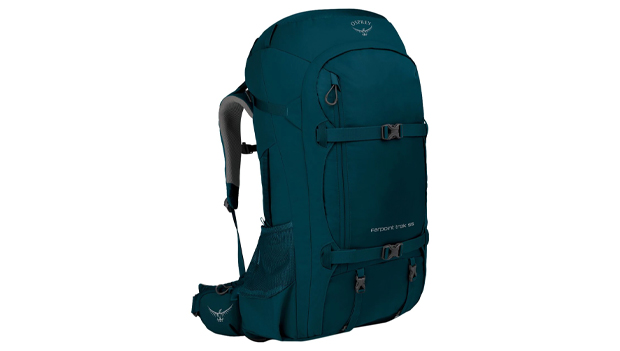
SPECS
- Material (main): 420HD nylon packcloth
- Material (accent and bottom): 500D nylon packcloth
- Capacity: 55L (3356 cu. in.)
- Weight: 4.225 lbs.
The Osprey Farpoint pack is our choice for the best overall hiking backpack because of its versatility. This pack can be used for carrying extra gear on a day hike, enjoying extended backpacking trips, or even supporting your international travel dreams.
When laid on its back, the main compartment opens up completely similar to a rolling suitcase so you no longer have to empty your pack to get to items that you mistakenly packed all the way at the bottom.
The pack's padded hip belt sits comfortably above your pelvic bone and offers four inches of adjustability so you can get it sitting exactly where you want it. Plus, it's equipped with a lightweight frame that stabilizes the load for comfortable carrying on remote hiking trails or along urban streets.
What We Like
- Multiple pockets for easy organization
- Padded interior sleeve for a laptop or hydration reservoir
- Comes with an Osprey AirCover rain cover
What We Don't Like
- A little heavy for long-distance hiking
- Might not fit carry-on luggage size standards for all airlines
BUY: Osprey Farpoint Trek 55L Travel Pack
Best Small Hiking Backpack - Arc'teryx Brize 25 Backpack
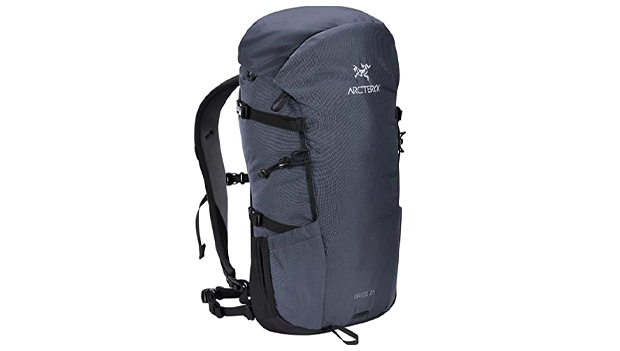
SPECS
- Material (main): N420p-HT nylon 6,6 plain weave
- Material (bottom): N630p fabric nylon 6,6 plain weave
- Capacity: 25L (1525.5 cu. in.)
- Weight: 2 lbs.
The Brize 25 is a great pack for technical day hikes but it can also be a great sidekick to a large suitcase or duffel when you're traveling. With versatile storage options, it can even be your daily pack for going to and from work, class, or wherever else you’re headed.
The pack's main compartment is accessed through a zippered top panel and it boasts two side pockets for water bottles, snacks, or other small accessories. Lighter items that you need easy access to can go in the zippered top pocket.
When traveling, the small interior pocket is great for stashing your passport or other small items. When you're on the trail, you'll love the comfort provided by the pack's thermoformed back panel and padded shoulder straps.
What We Like
- Compression straps on each side to stabilize the load
- Daisy chains on the front for securing trekking poles
- Compatible with a hydration bladder
What We Don't Like
- Minimal support in the hip belt
- No rain cover included
BUY: Arc'teryx Brize 25 Backpack
Best Backpack for Thru-Hiking - Osprey Atmos AG 65L Backpack
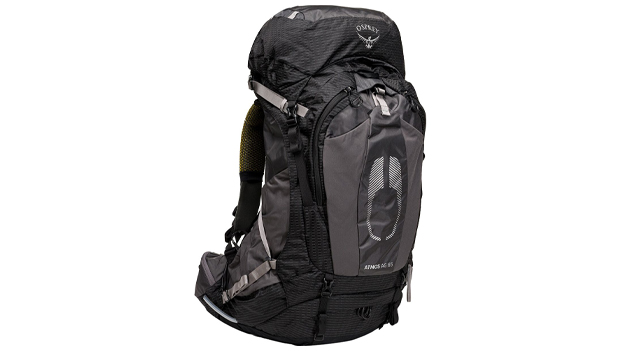
SPECS
- Material (main): 100D x 630D nylon dobby
- Material (accent): 210D high tenacity nylon
- Material (bottom): 420HD nylon packcloth
- Capacity: 62-68L (3783-4150 cu. in.)
- Weight: 4.475-4.6375 lbs.
When it comes to multi-day treks, most beginners carry quite a lot of gear. Before you trim things down for ultra-light hiking, this Osprey pack is one of your best options for thru-hiking.
It's designed for comfort and functionality with Osprey's patented Anti-Gravity Suspension, which provides ample cushion and ventilation. The shoulder straps also adjust up and down along the back panel, which provides a custom fit according to your body type.
The bottom compartment is specially made for your sleeping bag and includes straps to hold the bag in place. This pack also features an integrated FlapJacket rain cover and two sets of upper and lower compression straps to help you stabilize the load and bring it closer to your center of gravity.
What We Like
- Plenty of capacity
- Detachable lid/daypack for short adventures when camp is set up
- Accommodates hydration sleeves up to 3L
What We Don't Like
- A bit heavy for a long-distance thru-hike
- You must use Osprey's size chart to choose the pack size that matches your torso length
BUY: Osprey Atmos AG 65L Backpack
Best Lightweight Backpack for Hiking - Hyperlite Mountain Gear 3400 Southwest 55L Backpack
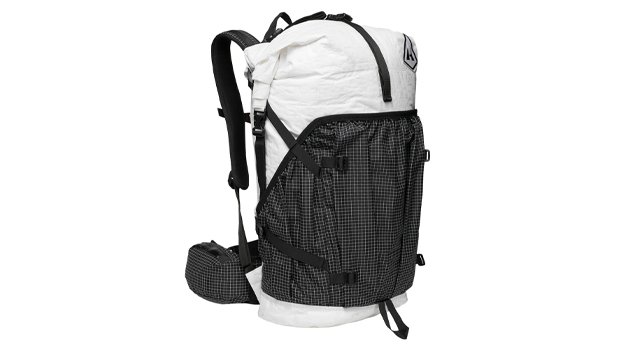
SPECS
- Material: Dyneema rope fabric
- Capacity: 55L (3356 cu. in.)
- Weight: 2-2.0625 lbs.
If you're interested in thru-hiking and your gear is ready for an ultra-light backpack, the Southwest pack from Hyperlite Mountain Gear is an excellent candidate. This pack weighs less than an average table lamp and still boasts ample capacity for warm-weather backpacking.
The pack's Dyneema material is responsible for its low weight but it also boasts removable aluminum stays that provide added rigidity. The large padded hip belt secures the pack around your torso and padded mesh provides cushioning and ventilation.
This pack is made with a roll-top closure that keeps moisture out and your gear secure. It also comes with a sleeve and port compatible with hydration reservoirs and external pockets for securing water bottles and other frequently needed items.
What We Like
- 5 exterior pockets offer an abundance of accessible storage
- Compression on the top and sides holds the pack weight close to your torso
- It's super light!
What We Don't Like
- On the more expensive side
- Built specifically for warm-weather adventures
BUY: Hyperlite Mountain Gear 3400 Southwest 55L Backpack
Best Hydration Backpack for Hiking - Osprey Katari 1.5L Backpack
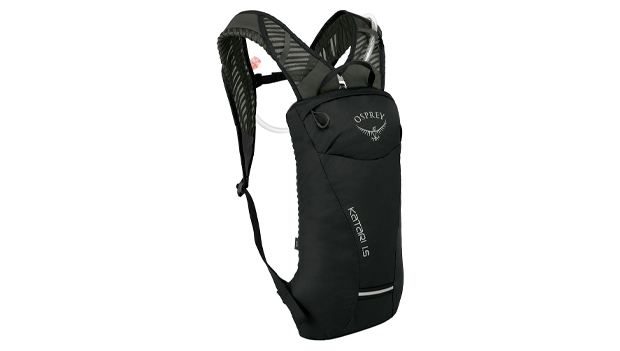
SPECS
- Material (main): 100D nylon mini diamond shadow
- Material (bottom): 600D polyester
- Capacity: 1.5L (92 cu. in.)
- Weight: 0.4375 lbs.
For short day hikes and trail runs, the Katari is a compact hydration pack that holds a 1.5-liter hydration reservoir. Also ideal for enduro, trail, or downhill mountain biking, the pack's AirScape backpanel promotes airflow to keep your back cool.
Inside, a foam framesheet helps to support the weight of the hydration bladder and provides structure for the entire pack. The stretchy shoulder straps are designed to conform to your body so this pack doesn't bounce around at high speeds.
You'll also love the accessibility of the pack's bite valve, which is held in place by the magnetic sternum strap. If you ever head out before dawn or stay out after dusk, the pack's taillight loop is perfect to attach a flasher for improved visibility.
What We Like
- Light and small; made for going fast with minimal bulk
- Won't bounce around during more active hiking
- An affordable option for casual hikers
What We Don't Like
- Minimal room for keys or trail snacks
- Made for maximum 2-3 hour adventures
BUY: Osprey Katari 1.5L Backpack
Best Budget Hiking Backpack - Burton Kilo 2.0 27L Backpack
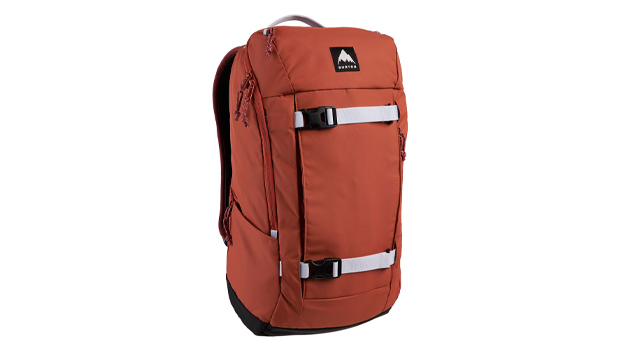
SPECS
- Material: 600D ripstop polyester
- Capacity: 27L (1648 cu. in.)
- Weight: 1.3 lbs.
If you liked the price tag associated with the Katari backpack but you need a bit more storage space, the Burton Kilo is a roomier alternative. This pack can handle day hiking, trips to get remote work done at local coffee shops, and your daily visit to the skate park.
It comes with carrying straps that allow you to strap your board to the exterior, but it also features padded sleeves to keep your laptop or tablet insulated from damage. It even boasts a fleece-lined pocket to keep your sunglasses safe and scratch-free.
The Kilo also boasts a front accessory pocket for smaller items and the exterior water bottle pocket fits bottles of various sizes. On the opposite side, another small pocket is great for trail snacks or as a dedicated pocket for your multi-tool.
What We Like
- Lightweight
- Affordable
- Offers plenty of protection for your electronics
What We Don't Like
- No hipbelt to take the weight off your shoulders
- Lacks ventilated back panel for airflow
BUY: Burton Kilo 2.0 27L Backpack
Best Waterproof Hiking Backpack - Patagonia Black Hole 32L Backpack
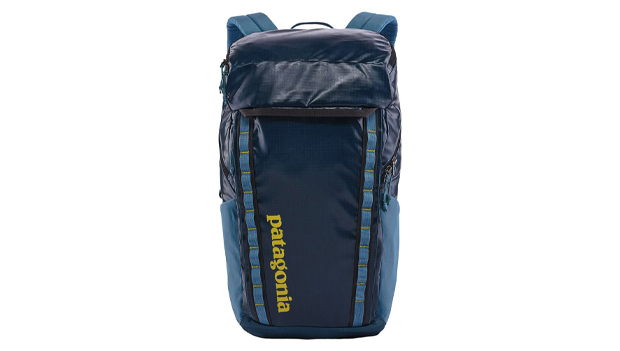
SPECS
- Material (main): 300D post-consumer recycled polyester ripstop
- Material (lining): 200D recycled polyester, PU coating, DWR coating
- Capacity:32L (1953 cu. in.)
- Weight:1.7875 lbs.
If you're a day hiker in the Pacific Northwest and you're tired of your extra layers getting soaked in unexpected rainstorms, Patagonia's Black Hole pack might be the upgrade you've been looking for.
The polyurethane and durable water-resistant coatings on this pack provide an extra degree of waterproofing that you won’t find in most daypacks. It's also incredibly durable and offers versatility for both everyday use and rugged outdoor adventures—a padded laptop sleeve provides protection for your computer or tablet and multiple daisy chain loops provide attachment points for trekking poles and other gear.
What We Like
- Compatible with hydration bladders
- Stretchy side pockets accommodate water bottles of varying sizes
- Mesh back panel promotes airflow to keep you cooler on hot days
What We Don't Like
- No hipbelt for added support
- Awkwardly-designed top zipper pocket
BUY: Patagonia Black Hole 32L Backpack
Best Hiking Backpack Under $100 - Thule AllTrail X15L Backpack
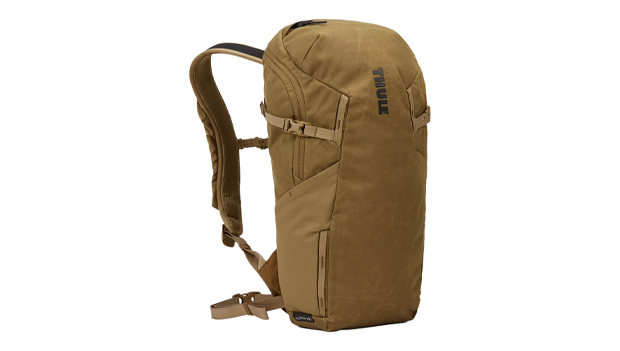
SPECS
- Material: 600D waxed polyester canvas (50% recycled)
- Capacity: 15L (915 cu. in.)
- Weight: 1.2 lbs.
If you're looking for a budget-friendly pack that offers plenty of excellent features for day hiking, Thule has you covered. The capacity is enough for short day trips, but this pack is also a great candidate for everyday carry.
It boasts an internal sleeve for hydration reservoirs and external attachment points for trekking poles and other hiking essentials. Plus, you'll be able to take advantage of two side pockets for water bottles and trail snacks.
If you need more accessible storage, there's another zippered pocket on the lid of the pack and a final pocket on the left shoulder strap. As you can tell, there's no shortage of small pockets to organize your gear on a day hike with this pack.
What We Like
- Waxed canvas exterior to repel water
- Padded shoulder straps and sternum strap
- Mesh back panel for added ventilation
What We Don't Like
- Minimal padding on the hipbelt
- A little small for all-day adventures
BUY: Thule AllTrail X 15L Backpack
Best Overnight Hiking Backpack - Gregory Baltoro 75L Backpack
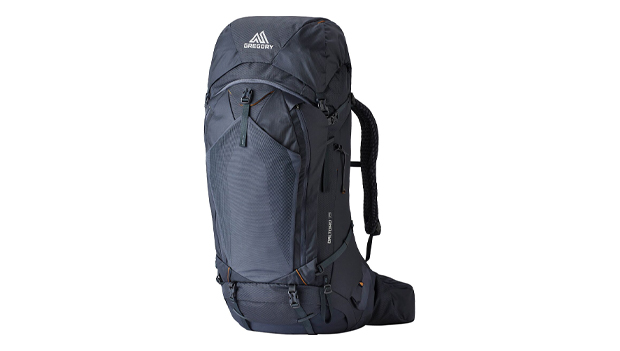
SPECS
- Material (main): 210D Honeycomb Cryptorip HD, 210D high-tenacity nylon
- Material (bottom): 630D high-density nylon
- Material (lining): 135D high-density embossed polyester
- Capacity: 75L (4575 cu. in.)
- Weight: 5.25 lbs.
For overnight trips when you're willing to carry a little more weight, the Baltoro offers the largest capacity of all the packs on our list, but it's also designed to help you carry that weight with ease and comfort.
The extra padding on the hipbelt cushions around your midsection and the shoulder straps can be adjusted for a customized fit. Load-lifter straps also help transfer the weight closer to your body's center of gravity.
The Baltoro even comes with its own dedicated rain cover and one of the hipbelt pockets is water-resistant to protect your electronics. It also boasts specific storage spaces for all your backpacking gear, helping you stay organized on the trail.
What We Like
- Comes with its own removable hydration sleeve
- Sleeping bag compartment boasts a removable divider
- Plenty of different pockets for keeping your camping gear organized
What We Don't Like
- It's the heaviest pack on our list
- It might be a little too large for hiking longer distances
BUY: Gregory Baltoro 75L Backpack
Most Comfortable Hiking Backpack - Osprey Exos 58L Backpack
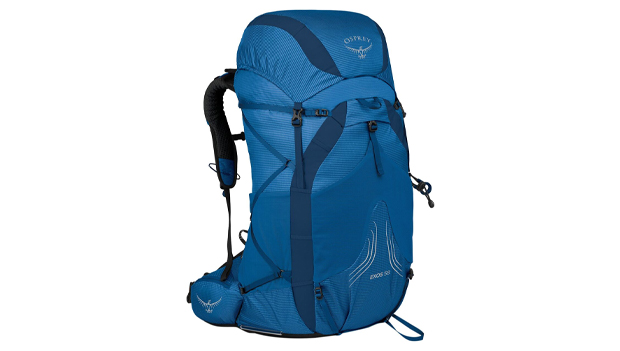
SPECS
- Material (main and bottom): Recycled 100D nylon ripstop, DWR
- Material (accent): Recycled 400D nylon ripstop, DWR
- Capacity: 58L (3539 cu. in.)
- Weight: 2.91 lbs.
There's a reason why this is the fourth Osprey backpack you've seen on this list, while no other brand has more than one. They make supremely comfortable packs that are durable and made for a variety of hiking styles.
The Exos is categorized as an ultra-light pack, making it an ideal choice for multi-day excursions in your local wilderness or thru-hikes in popular spots like the Pacific Crest Trail. Its comfortable suspension system offers excellent airflow and makes it easy to dial in proper load distribution for a comfortable carry.
When you encounter some technical terrain, you can use Osprey's Stow-on-the-Go attachment system to secure your trekking poles and proceed hands-free. This pack's durable ripstop material holds up even when it gets snagged on branches and rocks.
What We Like
- Lightweight and exceptionally comfortable
- Reservoir pocket and hose option for easy hydration on the move
- Durable water-repellent treatment for added water resistance
What We Don't Like
- It's a little pricey (but it's worth it!)
- Limited color options
FAQs About Hiking Backpacks
To give you a few more pointers on how to choose the right hiking backpack, let's answer some commonly asked questions about backpacks.
How heavy should my backpacking pack be?
There is a general rule that most hikers and backpackers try to follow: your pack shouldn't weigh more than one-third of your body weight. If you weigh 150 pounds, for example, your loaded backpack should weigh in at less than 50 pounds.
There's a difference between a loaded and unloaded pack, of course. This is less of a concern for day hikers, but backpackers should add up the weight of their tent, sleeping bag, pad, and other equipment. Then divide your body weight by three and subtract the weight of your gear from that number. The remainder will give you a baseline for the maximum pack weight you should look for.
Here's a quick example:
- Body weight = 150 lbs., 150/3 = 50 lbs. (maximum recommended pack weight)
- Combined gear weight = 45 lbs.
- 50-45 = 5 lbs. (recommended maximum pack weight, but lighter is always better!)
What size backpack do I need for a 3-day hike?
For any overnight hike, here's a quick breakdown of the gear you should pack in your hiking backpack:
- Tent (or hammock with tarp shelter)
- Sleeping bag
- Sleeping pad
- Backpacking stove
- Kitchen supplies (i.e. utensils, pot/pan, bowl/mug, etc.)
- Water filtration system
- Water bottle(s)
- Thermos
- Hiking shoes
- Small first aid and/or repair kit
- Meals and snacks (preferably in a bear-resistant canister)
- Weather-appropriate clothing
- Toiletries
For beginners, a 35-50 liter pack is a great place to start. Larger will make life easier when you're still learning how to pack a backpack properly. Plus, it will give you more room if your gear isn't exactly of the ultra-light variety.
Is hiking an expensive hobby?
All things considered, it's really one of the most affordable hobbies out there. This is especially true if your primary interest is in day hiking, which means you won't have to invest in the additional gear you'd need to spend the night out on the trail.
At the most basic level, you'll need a nice backpack and a quality pair of hiking boots to get started. If you're a beginner, you can easily acquire these two essentials for less than $200. Compared to what you'd need to get into hobbies like kayaking, paddle boarding, or mountain biking, hiking is very financially accessible.
How much should I spend on a backpacking backpack?
You'll find backpacks out there for less than $100 and high-end designs for over $400. The more technical the hiking, the more you can expect to spend. For beginners, spending between $100 and $200 is reasonable to get a pack that's going to last, especially if you're trying to get into multi-day backpacking trips.
Day hikers that are looking for smaller packs can still find quality models for less than $100. On the other hand, those interested in long-distance hiking and in need of an ultra-light pack can expect to see pack prices at the upper end of that range.
What should I look for when buying a hiking backpack?
Fit, function, and, of course, style. For starters, you need a pack that's going to fit your body well and feel comfortable when it's fully loaded. The best way to figure this out is to head to your local outdoor recreation store for a pack fitting.
They'll allow you to try out several different packs and most stores have weight bags that you can add to the pack to see how it will feel when it's loaded. The key here is to resist taking a pack home, even if you find one that you love. In many cases, you'll be able to find the same design at a lower price online, even with shipping costs.
The question of function largely comes down to personal preference. Some hikers prioritize a large main storage compartment while others prefer multiple smaller compartments to keep their gear organized. But the most important question to ask when it comes to function is: will it fit everything that I want to bring on my next hiking trip?
Finally, style shouldn't be your top priority, but if you look good on the trail you're bound to feel good. Don't be shy about searching for a visually striking pack or something that fits your unique personality. Even if you don't get a trail name on the PCT, your pack has the potential to turn a few heads!
How important is a hiking bag during a hike?
It's essential! Without a quality hiking backpack, you'll have nowhere to put your water bottle, snacks, and extra layers. Too many hikers get caught in unsafe conditions due to a lack of preparation. A hiking bag will help you prepare for the unexpected so you can enjoy safe, stress-free hiking adventures.


